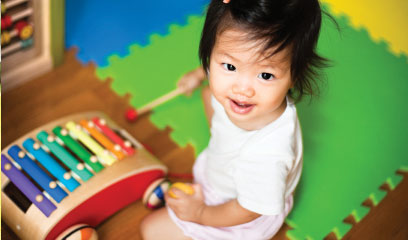 How important are the arts? Right up there with vocabulary and literacy, claim many educators, who advise parents to begin engaging their children in art activities early on. Researchers say there's reason to believe music stimulates your infant's brain, dance helps develop motor skills, and drama teaches emotions and problem solving.
How important are the arts? Right up there with vocabulary and literacy, claim many educators, who advise parents to begin engaging their children in art activities early on. Researchers say there's reason to believe music stimulates your infant's brain, dance helps develop motor skills, and drama teaches emotions and problem solving.
And that's just the beginning. "Preschoolers who were given keyboard lessons and did group singing scored higher on tests measuring spatial reasoning," reports a 1998 U.S. Department of Education Bulletin.
Such information on the arts has not been ignored by sharp-eyed toy executives. In fact, it's why formally quiet objects-say dollhouses-now play Beethoven while stimulating your child's other sensory receptors with flashing lights and fuzzy objects. It's also the reason there are more early music, dance and drama programs out there than ever-with a plethora of books, CDs and DVDs to accompany them.
While experts and educators agree that some parents take the theory too far (you'll probably enjoy Tchaikovsky more than your 6-week-old will), they also report that music, dance, painting, storytelling and acting can indeed help children learn.
"The arts are a thinking tool, a way for children to communicate understanding and misunderstandings and confront them," says Margie Carter, an early childhood specialist who has co-authored many books, including Training Teachers: A Harvest of Theory and Practice. "If you turn an idea into a drawing or sculpture, you can figure out things you'd never figure out if you just try to explain. The purpose of the arts goes way beyond creativity and imagination."
Exposure to the arts is a critical school readiness component, according to Rachael Glass, who teaches creative movement at the West Seattle YMCA. An actor and director, Glass has also taught preschoolers drama, music and dance in Head Start programs.
"School is so much more than reading, writing and arithmetic," Glass says. "The arts provide a way for children to discover they can make a contribution; it empowers them and raises their self-esteem. The arts let children put their own individual stamp on what they are good at."
Involvement in the arts also helps broaden children's abilities in other ways. Drawing, for example, can address emotional development, Glass says. "What does a happy face look like? A mad face? Children can draw and describe it. This is an important way for them to understand what makes them happy, sad or afraid."
Acting can help children learn about self-control, empathy or even bullying. "It is a way to problem solve, to learn to deal with frustrations, conflict resolving and social situations," Glass notes.
Drama and storytelling are good ways to help increase a child's vocabulary, she says. "A 3-year-old can get up and act like an animal; other kids can describe what they see. And a child who is performing must remember what step comes first. It enhances mental organization."
Music earned particular buzz after researchers identified the "Mozart Effect" more than 10 years ago and suggested that listening to 10 minutes of Mozart before a spatial skills test improved performance.
While the actual relationship between music and IQ remains unclear, music and movement instructor Patty Zeitlin feels that music can enhance cognitive skills. Zeitlin is also a recording artist and the author of A Song is a Rainbow, a textbook for preschool and kindergarten teachers. "The more you use language - talking or singing - the richer the brain connections are. The long, drawn-out vowels of singing nourish brain development," she says.
Music also serves as a language and learning vehicle for preverbal children, Zeitlin says. "Music can connect a child to language," she notes. "Children respond naturally to music; they can move to it, create their own verses and learn more easily in that mode."
Music, as well as the visual arts, drama and dance, give us insight into the way a child's mind works, Glass says. "They show us what kids understand. We should build upon those as another form of literacy."
Linda Morgan writes frequently on education issues for ParentMap. To comment on this story, contact editor@ParentMap.com
11 tips for introducing young children to the arts
Parents of young children can easily introduce music - and other arts - at home. Here's how:
1. Sing songs with your children. Don't worry about the way your voice sounds.
2. Play recordings of instruments and have some instruments around.
3. Take children to kids' concerts.
4. Play movement and finger-play games. Small children like to move when they sing.
5. Dance with your child.
6. Encourage your child to tell stories that have a beginning, middle and end.
7. Look for music and movement classes and sign your children up.
8. Look for preschools that understand the role of the arts in the learning process.
9. Keep art materials at home.
10. Go to art museums and creative venues that offer multidimensional activities for children.
11. Turn off the computer, video games and TV.
Suggestions are from Margie Carter, Patty Zeitlin and Rachael Glass.
Originally published in the June, 2004 print edition of ParentMap.









